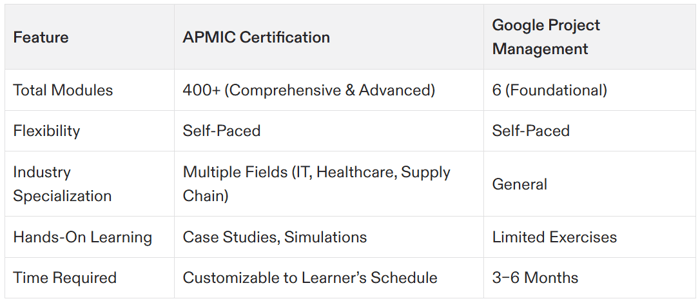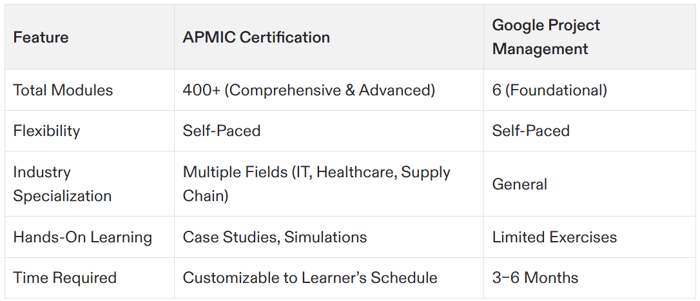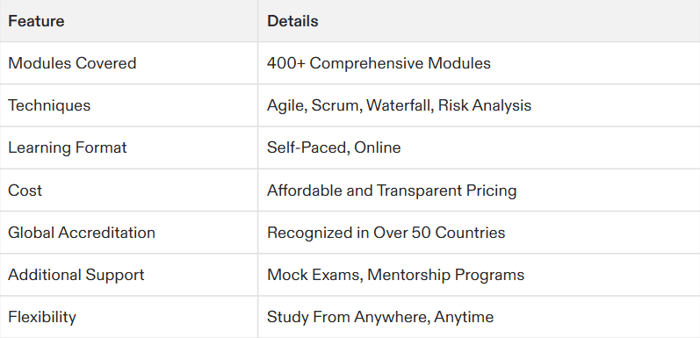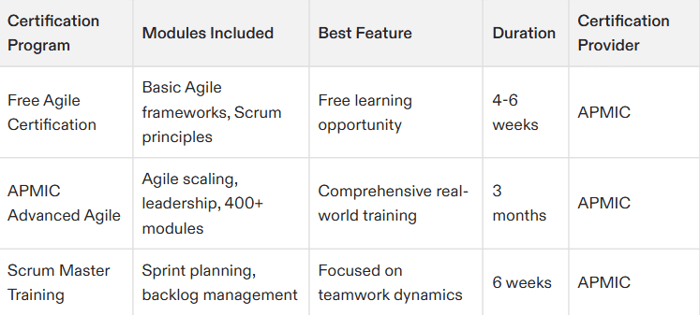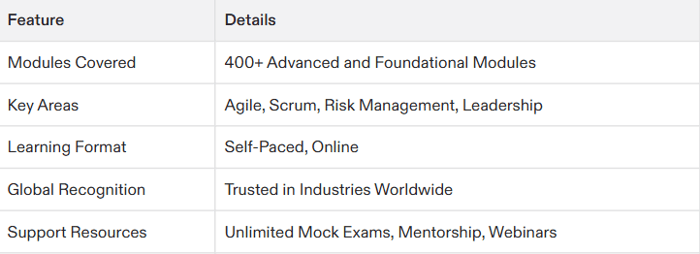Table of Contents
Introduction
Project management is an indispensable skill in today's global economy, where businesses rely on organized execution of their projects to drive success. Whether you’re a working professional looking to boost your career, or a student aiming to specialize early, learning how to get your project management certification can transform your opportunities.
This blog will guide you through every step of achieving your certification, from understanding its importance to selecting the right program, preparing effectively, and leveraging its benefits.
Why Get a Project Management Certification?
Before we dig into how to get your project management certification, it’s crucial to understand why certification matters. Certifications validate your expertise in planning, executing, and overseeing projects effectively, demonstrating your capability to employers and stakeholders.
Some key reasons to consider certification include:
- Career Advancement: Certified project managers earn up to 20% more than non-certified counterparts.
- Credibility: Credentials like PMP, PRINCE2, or APMIC bring trust in your ability to manage projects efficiently.
- Skill Development: Certification courses teach universal methodologies such as Agile, Scrum, and PMBOK frameworks.
- Broader Opportunities: Specializing in project management makes you a valuable candidate across industries like IT, healthcare, and construction.
Knowing how to get your project management certification can set you apart in the competitive job market and position you for leadership roles.
Types of Project Management Certifications
There isn't just one way to achieve certification; several globally recognized programs meet various professional needs. Here's a breakdown of top certifications you may consider as you explore how to get your project management certification.
1. Project Management Professional (PMP)
- Offered by: Project Management Institute (PMI)
- Focus Areas: Advanced methodologies, leadership, and strategic alignment.
- Time Required: 6–12 months, including experience prerequisites.
2. Certified Associate in Project Management (CAPM)
- Offered by: PMI
- Focus Areas: Basics of project management processes and tools as outlined in the PMBOK.
- Time Required: Often completed in 1–2 months.
3. PRINCE2 Foundation and Practitioner
- Offered by: Axelos
- Focus Areas: Process-oriented project management for scalable, structured projects.
- Time Required: Less than 2 months for both levels combined.
4. Google Project Management Certification
- Offered by: Google on Coursera
- Focus Areas: Entry-level management skills, risk assessment, and schedules.
- Time Required: 3–6 months (self-paced).
5. APMIC Project Management Certification
- Offered by: APMIC
- Focus Areas: Advanced multi-industry project management with over 400 modules, covering domains like healthcare, IT, and supply chain.
- Time Required: Self-paced, making it adaptable for working professionals.
Understanding the options available is the first step when navigating how to get your project management certification.
Steps to Get Your Project Management Certification
If you’re wondering how to get your project management certification, follow these steps to make the process smoother and more successful.
1. Define Your Goals
Before selecting a certification, identify why you want it and what you aim to achieve. For instance, are you seeking advanced roles in a specific industry, or do you need an entry-level credential to get started?
2. Choose the Right Certification
Decide which certification aligns with your career aspirations. For those interested in industry-specific management, APMIC’s versatile program is an excellent choice that features advanced tools and real-world applications. Visit here to learn more about APMIC’s certifications.
3. Meet the Prerequisites
Certifications like PMP require you to meet certain prerequisites, such as documented experience or education. Research what’s needed in advance and ensure your resume reflects the requirements.
4. Enroll in a Course
Register for a reliable training program, either through platforms like Coursera, Axelos, or APMIC. Look for a curriculum that aligns with your learning style, whether self-paced, live webinars, or instructor-led offerings.
5. Create a Study Schedule
Balancing study with work or other obligations can be challenging, so set aside dedicated time each week. Be consistent to ensure you cover all course materials before the certification exam.
6. Apply Practical Knowledge
Theoretical concepts make sense when paired with application. Many programs, like APMIC, incorporate hands-on projects and simulations. The more you practice building artifacts like project charters or Gantt charts, the more confidently you’ll approach the exam.
7. Take the Certification Exam
This is the defining step in how to get your project management certification. Prepare thoroughly using practice exams, study guides, and reviewer support. Schedule your exam when you’re confident in your readiness.
Benefits of Certification
The benefits of getting certified are substantial. Beyond salary potential and career growth, you’ll gain skills to help align diverse team efforts, minimize risks, and achieve company goals. Certifications like PMP and APMIC stand out for their industry acceptance and breadth of coverage, ensuring your investment pays off over time.
Addressing Common Challenges
Getting certified isn’t without obstacles. Here’s how to overcome some common challenges you might face when learning how to get your project management certification.
- Time Management: If you’re balancing work and study, opt for flexible programs like APMIC that allow you to learn at your own pace.
- Cost Concerns: Save on certification costs by comparing programs. Google and APMIC programs often cost less over time compared to others.
- Staying Motivated: Use study groups and online forums to maintain focus.
FAQ
Q1. How long does it take to get your project management certification?
The duration depends on the certification. For example, Google’s program takes 3–6 months, while APMIC’s self-paced program offers flexibility to complete its 400+ modules.
Q2. Are there certifications for beginners?
Yes. The Google Project Management Certification and CAPM are excellent options for beginners without prior project experience.
Q3. What is the most recognized certification?
PMP is globally recognized for advanced project management expertise. However, APMIC offers niche industry-focused training with unparalleled flexibility.
Q4. How do I prepare for certification exams?
Create a study schedule, use exam simulators, and apply concepts with hands-on projects.
Q5. Is online certification as credible as in-person training?
Yes. Reputable certifications like those offered by Google and APMIC hold equal weight in resumes and hiring decisions, thanks to their industry-standard curricula.
Informative Comparison Table
When understanding how to get your project management certification, take time to consider factors like flexibility, industry focus, and depth of learning.
Mastering project management begins by taking actionable steps today. Whether you aim for foundational certifications or advanced training like APMIC, the skills you gain will elevate your career for years to come. Learn more and get started on your path to success here.

